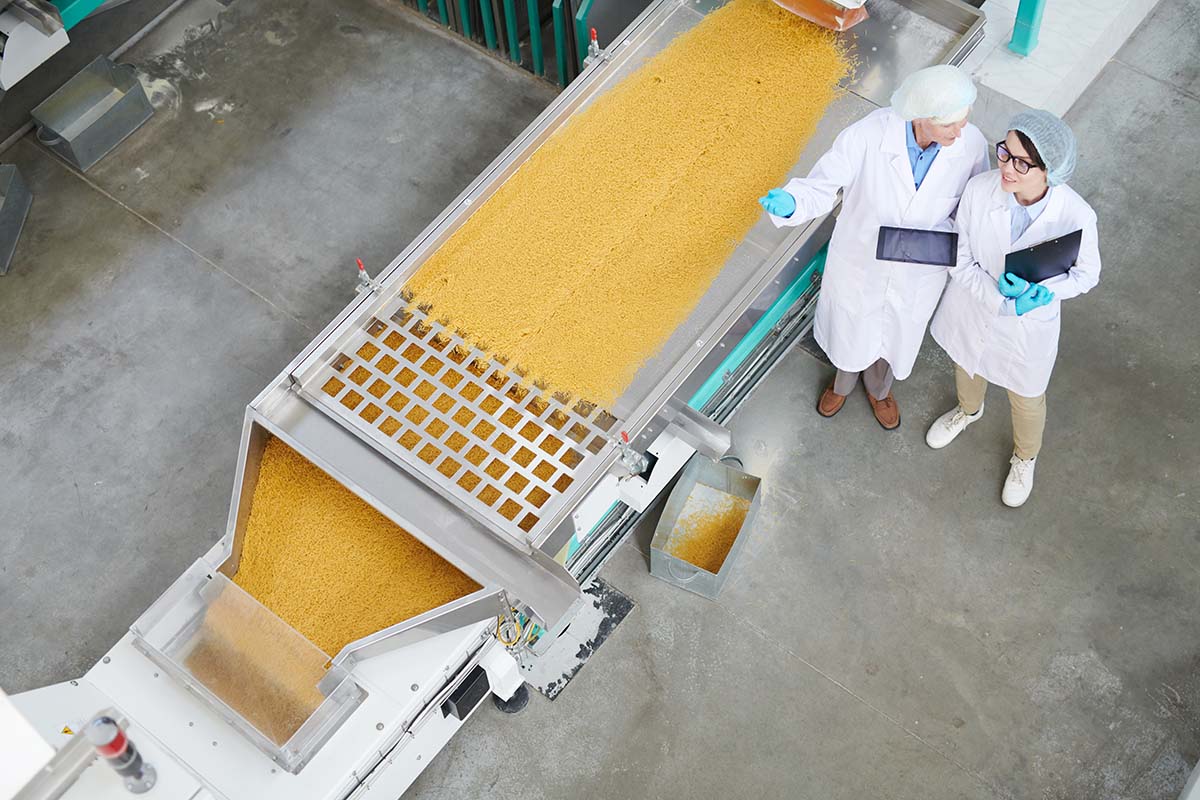Why Partnering with Contract Manufacturers Drives Growth

When looking for ways to drive efficiency, manufacturers would do well to consider contract manufacturing. Put simply, contract manufacturing is the practice of outsourcing the actual processes for the formulation, production, or packaging of items or components to a third party. Contract manufacturers are commonly referred to as “comans” and are frequently used in the food sector.
Today, many food companies use contract manufacturers to handle some of their operations. Well-known brands leveraging comans for lower costs and greater efficiency include The Kraft Heinz Company and General Mills. Both companies are working with more than one hundred external partners. Companies like Nestlé have pivoted from believing that internal production is the only way forward to allowing comans to play a more prominent role in manufacturing footprints.
This trend towards leveraging external partners instead of or in addition to in-house operations will continue to grow. According to Grand View Research, the global food contract manufacturing market is expected to expand with a CAGR of 9.7% until 2030. Asia Pacific is leading the contract manufacturing market and accounts for 53.0% of the global revenue and is expected to grow at the fastest CAGR of 10.3%. North America is in a transition phase with food companies becoming more reliant on comans for product formulation, quality control, and production capabilities. Moreover, the consolidation in the North American contract manufacturing landscape is happening rapidly which is expected to boost industry growth. In Europe, we still see a very fragmented coman landscape with consolidation just starting.
A New Breed of Coman
For some years now, a new breed of comans has been emerging in the food industry. These comans have developed above and beyond the basic operational capabilities of what traditional comans are known for, which is being cost-efficient, reliable and flexible, with high quality standards. This new breed of comans is offering services to help food companies accelerate growth.
Based on many years working for clients in the food industry, I offer three strategies with examples of how food companies can partner with these comans to drive growth in their businesses. These strategies can work across food categories and geographies, for food start-ups and big players alike and any size in between.
Read on to discover how this new breed of comans can help your food company drive growth by:
- Accelerating your route-to-market
- Extending your reach into new markets
- Putting your cost management first
Accelerating route-to-market
In most food categories, product life cycles are getting shorter and shorter as consumers expect more variation, personalization, and innovation. As a food company, it is impossible to stay up to date on all the latest consumer trends and innovations in processing, technology, and packaging. Some big players have billion-dollar R&D budgets, but most companies need external help. Here, comans can play an important role in stretching R&D dollars and adding additional resources to increase speed to market.
In one example, I was helping to create a new range of healthy snacking products for a regional food champion. One of the products was gummies with functional health benefits (e.g., mood-boosting and stress relief). We identified a coman in China with the R&D capabilities and world-class manufacturing to launch these products in several Asian markets. The benefits of partnering were obvious: it would have taken my client too long to build this R&D expertise in-house and it would have required CAPEX in advanced processing technologies which can be risky when introducing new products.
Extending your product portfolio becomes even easier when you find the right coman to partner with. While at a different global food brand, I remember a meeting with a leading European coman of pet food. On our meeting table, there were not only the products that we made together, but also a dozen other products that they could potentially make for us, including products that they were producing for competitors. Every product formulation and packaging format seemed possible, all at very competitive prices and with immediately available production capacity. It was clear that the coman knew how to excite marketing and sales teams with the potential to expand a product portfolio.
Sometimes working with comans exclusively (vs. setting up internal production) is a preferred or potentially the only viable operating model. I recently worked with a food start-up in the healthy culinary protein market. They make a plant-based product as a meat replacement in prepared meals and as a protein base for meals that you cook yourself at home. This food start-up made the conscious decision to solely work with comans so it could focus on conducting consumer product tests and delighting its customers, giving them the ability to quickly react to market feedback. For cash-strapped food start-ups, working with external manufacturing partners is often the only viable route-to-market because setting up internal production requires a lot of funding.
Extending reach into new markets
A coman can also be used to expand operations into new geographic markets. For example, shipping food products from the U.S. to Europe can easily take more than 3 weeks and requires a lot of documents and certificates to clear import customs. This of course adds to the product cost and affects the shelf life of the products. It is also limiting, as many food products can only travel in cooled shipping containers. Exporting can be the preferred and often the only option, but if you’re looking to substantially grow your global footprint then a local coman can be a better solution.
Last year I supported a North American confectionery company to establish a European manufacturing footprint. Exporting from its East Coast factories created inefficiencies (e.g., more changeovers because of non-GMO requirements) and it made the supply chain unresponsive and difficult to manage. Investing CAPEX in a greenfield is capital-intensive and was considered too risky as volumes were still relatively low. Therefore, partnering with a coman was the preferred solution. I reviewed dozens of potential comans and visited a handful of top candidates. My client eventually signed a coman agreement with a local confectionery company and now has the perfect manufacturing platform to drive growth in its European business.
Another option is to ship semi-finished food products overseas and have a local coman do the final finishing and packing for you. This setup allows you to keep control of a major part of the food production while the coman can guarantee compliance with local quality and food safety regulations. A European chocolate manufacturer I work with is using this setup to reach overseas markets. At its main factories, chocolate is frozen in big slabs and shipped internationally. At the local destination, an external partner is responsible for unfreezing the chocolate and shaping and packaging the final products.
Putting cost management first
Food companies have recently faced a litany of challenges, from the pandemic to the surge in food commodity prices and energy costs, in tandem with labor and skills shortages that pushed up wages and required heavy investments in digital processes and factory automation, all of which have made it much more difficult to control product cost. The need to control costs is creating a relentless drive towards efficiency. In the pursuit of cost efficiency, food companies should leverage comans by shifting activities that aren’t as lucrative to own/control so that they can focus investments where it matters.
When talking to factory managers in food companies, I often hear them complain about products that push down the overall operational efficiency of their factory. For example, products with low volume and high complexity (e.g., those with different sizes, flavors, and packaging formats). Or products that require more manual labor compared to normal products, often leading to staffing issues. Finally, products that are not considered strategic anymore or products that are nearing the end of the product life cycle can also create operational challenges. Factory managers typically have limited options internally to boost the operational efficiency of those products. Therefore, partnering with comans to take the production externally is often the best solution.
This new breed of comans has been more proactive in directly targeting the needs of factory managers by providing support in building business cases to move certain products externally. By offering those operational solutions to food companies, comans help food companies achieve cost efficiency and free up time and resources to invest in products that drive growth.
Final Thoughts
The contract manufacturing landscape in the food industry is changing rapidly. Traditional comans still exist but they are being surpassed by a new breed of comans with the skills and capabilities to help food companies drive growth. Food companies can partner with those comans to accelerate route-to-market, expand into new markets, and put cost management first.
Are you looking to better leverage relationships with your comans? Does your company need support with the search and selection process? Or do you need an assessment of the contract manufacturing landscape? Reach out to the Independent Experts at Catalant for industry expertise or fresh innovative thinking.
Find optimization and transformation Experts now.
Let’s TalkMeet the Author

Mathieu Van Assche is an Expert on the Catalant platform with 20 years of experience in Growth Strategy, Business Agility, Performance Improvement and Transformation. He focuses on advising food companies, from big players to regional champions, as well as private label brands and contract manufacturers. Mathieu spent a decade at Nestlé and worked as an independent consultant for Food Industry clients such as The Hershey Company, Migros Industrie, Dr. Oetker and RAP Confectionery. Mathieu has an MBA from the Ross School of Business at the University of Michigan and a M.Sc. in Business Engineering from the University of Antwerp.
Want to work directly with Mathieu? Contact us to learn how.











